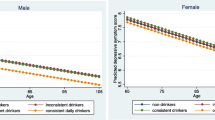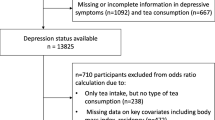Abstract
Background
Although tea consumption has been reported to have various health benefits in humans, its association with health-related quality of life (HRQOL) has not been investigated directly. We aimed to examine the relationship between tea consumption and HRQOL among older Chinese adults.
Methods
We analyzed community-based cross-sectional data of 5,557 older Chinese individuals aged 60 years or older who participated in the Weitang Geriatric Diseases study. Information on tea consumption and HRQOL assessed by the European Quality of Life-5 dimensions (EQ-5D) were collected by questionnaires. We estimated the relationship of tea consumption and the EQ-5D index score using linear regression models and the association between tea consumption and self-reported EQ-5D health problems using logistic regression models.
Results
The EQ-5D index score was higher for habitual tea drinkers than their counterparts. In multivariate linear analyses controlling for socio-demographic conditions, health conditions, and lifestyle habits, the differences in ED-5D index score between individuals with and without tea drinking habits was 0.012 (95% confidence interval, 0.006-0.017). In multivariate logistic analyses, habitual tea drinking was inversely associated with reporting of problems in EQ-5D dimensions mobility (odds ration [OR], 0.44; 95% CI: 0.23-0.84); pain/discomfort (OR, 0.74; 95% CI: 0.61-0.90); and anxiety/depression (OR, 0.60; 95% CI: 0.38-0.97). These associations were more evident for black or oolong tea than green tea.
Conclusion
Habitual tea consumption was associated with better HRQOL in older adults.



Similar content being viewed by others
References
Statista. Global production and exports of tea 2004-2012. http://www.statista.com/statistics/264183/global-production-and-exports-of-tea-since-2004/. Accessed 14, May, 2015.
Xu N, Chen ZM. Green tea, black tea, and semi-fermented tea. In: Zhen Y-S, ed. Tea bioactivity and therapeutic potential. London, United Kingdom: CRC Press UK, 2002:35–54.
Chen ZM, Xu N. Agronomy and commercial production of tea. In: Zhen Y-S, ed. Tea: bioactivity and therapeutic potential. London, United Kingdom: CRC Press UK, 2002:243–256.
Cabrera C, Gimenez R, Lopez MC. Determination of tea components with antioxidant activity. J Agric Food Chem. 2003;51(5):4427–4435.
Osada K, Takahashi M, Hoshina S, et al. Tea catechins inhibit cholesterol oxidation accompanying oxidation of low density lipoprotein in vitro. Comp Biochem Physiol Part C Toxicol Pharmacol. 2001;128(2):153–164.
Tipoe GL, Leung TM, Hung MW, et al. Green tea polyphenols as an anti-oxidant and anti-inflammatory agent for cardiovascular protection. Cardiovasc Hematol Disord Drug Targets. 2007;7(2):135–144.
Reznichenko L, Amit T, Youdim MB, et al. Green tea polyphenol (-)-epigallocatechin-3-gallate induces neurorescue of long-term serum-deprived PC12 cells and promotes neuroprotective outgrowth. J Neurochem. 2005;93(5):1157–1167.
Nathan PJ, Lu K, Gray M, et al. The neuropharmacology of L-theanine (N-ethyl-L-glutamine): a possible neuroprotective and cognitive enhancing agent. J Herb Pharmacother. 2006;6(2):21–30.
Wang W, Yang Y, Zhang W, et al. Association of tea consumption and the risk of oral cancer: a meta-analysis. Oral Oncology. 2014;50(4):276–281.
Sun CL, Yuan JM, Koh WP, et al. Green tea, black tea and colorectal cancer risk: a meta-analysis of epidemiologic studies. Carcinogenesis. 2006;27(7):1301–1309.
Sun CL, Yuan JM, Koh WP, et al. Green tea, black tea and breast cancer risk: a metaanalysis of epidemiologic studies. Carcinogenesis. 2006;27(7):1310–1315.
Lambert JD. Does tea prevent cancer? Evidence from laboratory and human intervention studies. Am J Clin Nutr. 2013;98(6):1667S–1675S.
Huxley RR, Neil HA. The relationship between dietary flavonol intake and coronary heart disease mortality: a meta-analysis of prospective cohort studies. Eur J Clin Nutr. 2003;57(8):904–908.
Arab L, Khan F, Lam H. Tea consumption and cardiovascular disease risk. Am J Clin Nutr. 2013;98(6):1651S–1659S.
Nabavi S, Daglia M, Moghaddam A, et al. Tea consumption and risk of ischemic stroke: a brief review of the literature. Curr pharm Biotechnol. 2014;15(4):298–303.
Arab L, Liu W, Elashoff D. Green and black tea consumption and risk of stroke: a meta-analysis. Stroke. 2009;40(5):1786–1792.
Odegaard AO, Pereira MA, Koh WP, et al. Coffee, tea, and incident type 2 diabetes: the Singapore Chinese Health Study. Am J Clin Nutr. 2008;88(4):979–985.
Katiya SK, Raman C. Green tea: a new option for the prevention of control of osteoarthritis. Arthritis Res Ther. 2011;13(4):121.
Feng L, Chong MS, Lim WS, et al. Tea for Alzheimer prevention. J Prev Alz Dis. 2015;2(2):136–141.
Kuriyama S, Shimazu T, Ohmori K, et al. Green tea consumption and mortality due to cardiovascular disease, cancer, and all causes in Japan: the Ohsaki study. JAMA. 2006;296(10):1255–1265.
Kuriyama S, Hozawa A, Ohmori K, et al. Green tea consumption and cognitive function: a cross-sectional study from the Tsurugaya Project 1. Am J Clin Nutr. 2006;83(2):355–361.
Ng TP, Feng L, Niti M, et al. Tea consumption and cognitive impairment and decline in older Chinese adults. Am J Clin Nutr. 2008;88(1):224–231.
Panza F, Solfrizzi V, Barulli MR, et al. Coffee, tea, and caffeine consumption and prevention of later-life cognitive decline and dementia: a systematic review. J Nutr Health Aging. 2015;19(3):313–328.
Hintikka J, Tolmunen T, Honkalampi K, et al. Daily tea drinking is associated with a low level of depressive symptoms in the Finnish general population. Eur J Epidemiol. 2005;20(4):359–363.
Niu K, Hozawa A, Kuriyama S, et al. Green tea consumption is associated with depressive symptoms in the elderly. Am J Clin Nutr. 2009;90(6):1615–1622.
Hozawa A, Kuryiyama S, Nakaya N, et al. Green tea consumption is associated with lower psychological distress in a general population: the Ohsaki Chort 2006 study. Am J Clin Nutr. 2009;90(5):1390–1396.
NG TP, Aung KCY, Feng L, et al. Tea consumption and physical function in older adults: a cross-sectional study. J Nutr Health Aging. 2014;18(2):161–166.
Brooks R. EuroQol: the current state of play. Health Policy. 1996;37(1):1303–1307.
Gusi N, Olivares, Rajendram. The EQ-5D health-realted quality of life questionnaire. In: Preedy VR, Watson RR, eds. Handbook of disease brudents and quality of life measures. New York, United States: Sprigner-Verlag New York. 2010:87–99.
Liu G, Wu H, Li M, et al. Chinese time trade-off values for EQ-5D health states. Value Health. 2014;17(5):597–603.
Wang H, Kindig DA, Mullahy J. Variation in Chinese population health related quality of life: results from a EuroQol study in Beijing, China. Qual Life Res. 2005;14(1):119–132.
Zhao FL, Yue M, Yang H, et al. Validation and comparison of EuroQol and short form 6D in chronic prostatitis patients. Value Health, 2010;13(5):649–656.
Wang HM, Patrick DL, Edwards TC, et al. Validation of the EQ-5D in a general population sample in urban China. Qual Life Res. 2012;21(1):155–160.
Wu J, Han Y, Zhao FL, et al. Validation and comparison of EuroQol-5 dimension (EQ-5D) and short form-6 (SF-6D) among stable angina patients. Health Qual Life Outcomes. 2014;12:156.
Sahadevan S, Tan JL, Tan T, et al. Cognitive testing of elderly Chinese people in Singapore: Influence of education and age on normative scores. Age and Ageing. 1997;26(6):481–486.
Chylack LT, Jr., Wolfe JK, Singer DM, et al. The Lens Opacities Classification System III. The Longitudinal Study of Cataract Study Group. Arch Ophthalmol. 1993;111(6):831–836.
Totsch SK, Waite ME, Sorge RE. Dietary influence on pain via immune system. Prog Mol Biol Transl Sci. 2015;13:435–469.
Tomata Y, Kakizaki M, Nakaya N, et al. Green tea consumption and the risk of incident functional disability in elderly Japanese: the Ohsaki Cohort 2006 study. Am J Clin Nutr. 2012;95(3):732–739.
Serafini M, Ghiselli A, Ferro-Luzzi A. In vivo antioxidant effect of green tea and black tea in man. Eur J Clin Nutr. 1996;50(1):28–32.
Weinreb O, Mandel S, Amit T, et al. Neurological mechanisms of green tea polyphenols in Alzheimer’s and Parkinson’s disease. J Nutr Biochem. 2004;15(9):506–516.
Cao H, Kelly MA, Kari F, et al. Green tea increases anti-inflammatory tristetraprolin and decrease pro-inflammatory tumor necrosis factor mRNA in rats. J Inflamm(Lond). 2007;4:1.
Cesari M, Pahor M, Bartali B, et al. Antioxidants and physical performance in elderly persons: the Invecchiare in Chianti (InCHIANTI) study. Am J Clin Nutr. 2004;79(2):289–294.
Pan T, Jankovic J, Le W. Potential therapeutic properties of green tea polyphenols in Parkinson’s disease. Drugs Aging. 2003;20(10):711–721.
Kimujra K, Ozeki M, Juneja LR,et al. L-Theanine reduces psychological and physiological stress responses. Biol Psychol. 2007;74(1):39–45.
Nathan PJ, Lu K, Gray M, et al. The neuropharmacology of L-theanine (N-ethyl-L-glutamine): a possible neuroprotective and cognitive enhancing agent. J Herb Pharmacother. 2006;6(2):21–30.
Henning SM, Niu Y, Lee NH, et al. Bioavailability and antioxidant activity of tea flavanols after consumption of green tea, black tea, or a green tea extract supplement. Am J Clin Nutr. 2004;80(6):1558–1564.
Luczaj W, Skrzydlewska E. Antioxidative properties of black tea. Prev Med. 2005;40(6):910–918.
Walters SJ, Brazier JE. Comparison of the minimally important difference for two health state utility measures: EQ-5D and SF-6D. Qual Life Res. 2005;14(6):1523–1532.
Tea Association of the U.S.A.Inc. Tea fact sheet-2014. http://www.teausa.com/14655/tea-fact-sheet. Accessed 14, December, 2015.
Drinking four or more cups of tea can lower the risk of middle-aged related diabetes. Daily Mail Online. http://www.dailymail.co.uk/health/article-2154409/Drinking-tealower-risk-diabetes—drink-cups-day.html. Accessed 4, April, 2016.
Ageing and Life Course. World Health Organization. http://www.who.int/ageing/en/. Accessed 14, May, 2015.
Ehrnborg C, Lange KH, Dall R, Christiansen JS, Lundberg PA, Baxter RC, Boroujerdi MA, Bengtsson BA, Healey ML, Pentecost C, Longobardi S, Napoli R, Rosén T; GH-2000 Study Group. The growth hormone/insulin-like growth factor-I axis hormones and bone markers in elite athletes in response to a maximum exercise test. J Clin Endocrinol Metab. 2003;88(1):394–401.
Author information
Authors and Affiliations
Corresponding author
Rights and permissions
About this article
Cite this article
Pan, CW., Ma, Q., Sun, HP. et al. Tea consumption and health-related quality of life in older adults. J Nutr Health Aging 21, 480–486 (2017). https://doi.org/10.1007/s12603-016-0784-0
Received:
Accepted:
Published:
Issue Date:
DOI: https://doi.org/10.1007/s12603-016-0784-0




